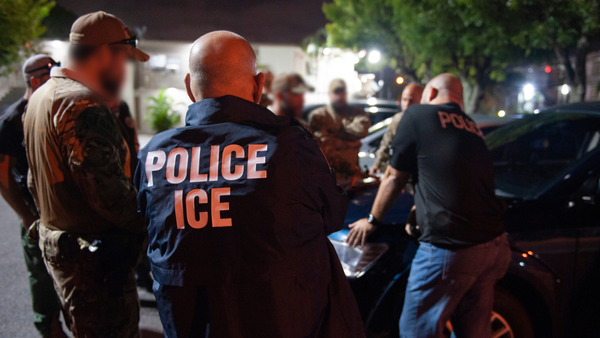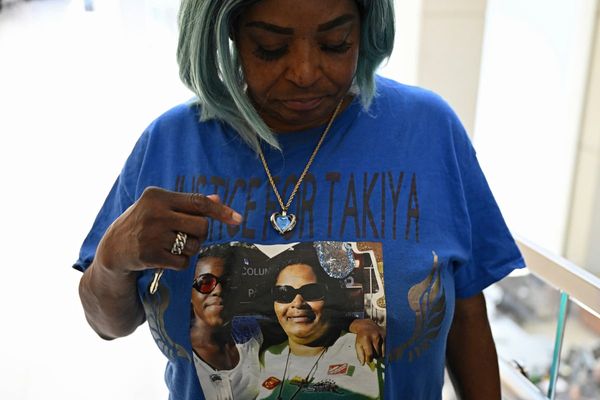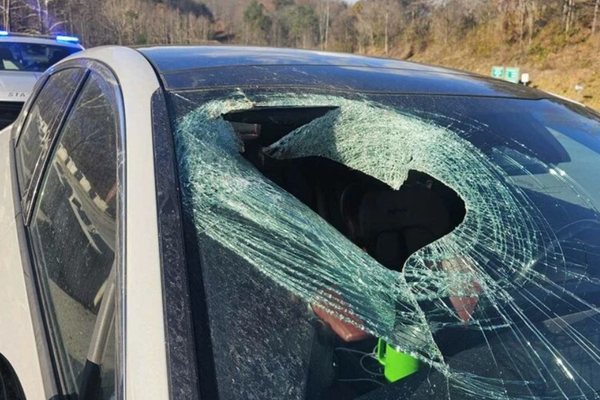
The town of Capella in central Queensland is home to fewer than 1,000 living souls and has no grocery store.
But by Christmas it may be home to a machine worth hundreds of thousands of dollars that liquidises human remains into an urnful of white powdered bones.
The conversion of an old Anglican church into a water-based crematorium will be an expansion of the local business portfolio of Wendy and Mark Tasker, who run a nearby cattle property as well as forklift and rural supplies stores in town. But for Wendy – who also works part-time preparing bodies at a funeral parlour in the neighbouring town of Emerald – it will also fulfil a lifelong ambition.
“It’s always been my passion,” she says. “Even when I was a little child, I’ve always wanted to be a mortician. I know it’s strange … but I just like to help people in their time of grief.”
It is a passion that drove Tasker to lodge plans with council last August to build a facility to house an alkaline hydrolysis machine on the grounds of the deconsecrated timber church.
The plans were approved in March. Tasker hopes to switch the machine on by the new year.
For some in this largely conservative farming community, the prospect of this novel form of dealing with death has been “daunting”, Tasker says. So, when it is operational, she plans on holding an open day to dispel misconceptions about the new machine.
“We’re not just putting someone in a barrel of acid, like some people think,” she says.
Once they learn the truth about what is known colloquially as water cremation, Tasker believes, many will come around to the practice.
The process involves water, heat and alkaline chemicals which are, in fact, the chemical opposite of acids – alkalis are used to manufacture soaps, detergent and batteries, they are even used as food additives.
Tasker’s machine gently rocks the warm water and potassium hydroxide to accelerate the natural decomposition of the body. Dissolved of flesh, the bones are dried and crushed.
Without the need to buy a coffin, Tasker argues, families can save money on what can be one of the bigger expenses of a funeral.
But one of the most compelling arguments Tasker will have in her favour may come as a surprise to an outsider, given that Capella sits in the heartland of Queensland’s coal country.
“A lot of people are thinking more of the ozone layer and [with alkaline hydrolysis] there is no smoke, so it’s not going to pollute the air,” Tasker says. “So many people are more aware of, I suppose, environmentally friendly stuff at the moment.
“This is the way it’s going to go in the future”.
Bereavement is big business
These claims of providing both greener and cheaper funerals are why the man who manufactured Tasker’s alkaline hydrolysis machine sees himself as a disruptor to the big business of death.
Jeff Boyle is an entrepreneur from Proserpine, a Queensland sugar cane town of fewer than 3,500 people, named for the Roman queen of the underworld, and gateway to the paradisiacal Whitsunday islands.
A career funeral director, Boyle long ran the kind of traditional, family-operated funeral parlours that, once upon a time, conducted almost all death rituals in Australia.
But that is an archetype Boyle says no longer holds true.
“Most people don’t know, but [many of the] funeral homes in Australia are owned by America now,” he says. “It’s not about the families any more. It’s not about anyone that matters. It’s just the profit”.
There is, no doubt, money to be made from funerals – a 2025 IBISWorld report forecast the $2bn sector to grow by a quarter by the end of the decade. A single company, InvoCare, controls about 34% of that market. InvoCare was acquired by US private equity firm TPG Global in late 2023 and consists of more than 40 funeral brands and 15 cemeteries and crematoriums across Australia, headlined by White Lady and Simplicity Funerals and Value Cremations.
The nation’s second largest private provider of death care services, Propel Funeral Partners, is listed on the Australian Stock Exchange, and states its vision is to “consolidate the fragmented death care industry in Australia and New Zealand”.
The death care industry in Australia is largely regulated by its states – Victoria does not allow private businesses to own cemeteries or crematoriums, which are instead placed into trusts. The two big Victorian cemetery trusts and the three biggest private companies in the country control 58% of the market.
In 2017, a report by two accounting professors in New South Wales called “It’s Your Funeral” found the then “recent corporatisation and increasing concentration” of the sector warranted concerns about “predatory marketing and price gouging”.
It was against this backdrop that Boyle says he embarked on a near decade-long journey to develop and patent his own style of alkaline hydrolysis machine he calls “The Gentle Way” – and the likes of which he claims is built nowhere else on earth.
“You have to make money in business, absolutely,” Boyle says. “But you don’t need to rip people off – and you don’t need to take advantage of people in their most vulnerable time”.
Funeral industry ‘shrouded in mystery’
Sandra van der Laan’s sister was a single mother of three young adults and teenagers when she died suddenly in 2014.
Like more than 90% of Australians she died in an institution – in this case, a hospital. There was instantly pressure upon her loved ones to foot the bill and remove the body.
“Being an organised person, I started to ring around funeral directors,” Van der Laan, a professor at the University of Sydney, says.
She received several quotes for the funeral of about $6,500.
“But they wouldn’t tell me what the breakdown was, and I wasn’t happy with that, so I ended up doing a bit of research,” Van der Laan says. “Because that’s what I do.”
When she dug into it, Van der Laan discovered fees included expensive coffins and the bundling of “completely unnecessary” services such as the provision of sandwiches.
An accountant by trade, she managed to shave almost $3,000 off the quoted price, but knows most people do not possess her ability to unpick figures; the experience spurred her on to a “crusade” which she continues to wage more than a decade later.
Van der Laan co-authored the “It’s Your Funeral” investigation – which found a lack of competition, regulation and transparency created opportunities for “predatory pricing” and marketing towards vulnerable customers.
Van der Laan, though, is not calling for a regulatory crackdown on an industry that, in most states, can require little more than a council permit to enter.
“I don’t believe that the state needs to intervene in everything we do,” she says. “But at the same time, I feel that vested interests, like funeral operators, shouldn’t be making it tougher for people to be able to have a dignified funeral for their loved ones.”
Instead, the professor advocates forcing operators to be transparent about costs, creating platforms for consumers to compare options and simply getting people to talk about – and thereby prepare for – death.
“We have this death denial culture … [and so] this industry is shrouded in mystery,” she says.
“But nothing is more certain than that everyone is going to die.”
While Van der Laan may not be clamouring for regulation, at least two pioneers of alkaline hydrolysis machines in Australia agree the industry required greater oversight.
In 2010 John Humphries opened what was reported as the world’s first water cremation funeral service on the Gold Coast, claiming to have invented the word “aquamation”.
After complaining about “shonky operators” being attracted to the industry in the years since, Humphries said it “probably” did require greater regulation and higher standards.
“If you want to set up a crematorium, basically you can rent a factory, buy an incinerator and you’re in business,” he said. “You need a town planning permit – but that’s it.”
Boyle, founder of The Gentle Way, agrees.
“There is no regulation in the funeral industry,” he says. “I wish there was, but there is nothing”.
‘Weird and wonderful world’
University of Melbourne DeathTech research team’s Dr Hannah Gould argues the death care sector is also in dire need of independent research.
Gould says the last decade has seen “a heap of energy” invested with people “trying new things, experimenting and developing new technologies” to dispose of the dead.
Alkaline hydrolysis is the most notable among these, she says. But while not yet legal in Australia, human composting – or terramation – is gaining traction in the United States as it pitches itself to Silicon Valley investors. In Australia, companies offer biodegradable urns designed to convert ashes to trees and burial suits of mushroom spores to aid in “natural” burials.
“Welcome to the weird and wonderful world that is green death tech,” Gould says.
The premise for these innovations, the death and religion researcher says, is “the significant environmental drawbacks” of the two traditional ways of handling the dead.
Burial takes up swathes of valuable land, while cremation can be fossil fuel intensive and emit toxic pollutants such as the mercury in dental fillings.
But death tech can be as susceptible to “bad statistics”, opaque research, “greenwashing” and petty rivalry as any other burgeoning industry full of startups and disruptors jostling for investment and growth.
“A lot of progress in this sector has been stymied very much by these claims and counter-claims and, more broadly I suppose, by death being wrapped up in private enterprise,” she says.
So the question of what is the greenest option for disposing of a body – one Gould is asked frequently – is, she says, very complicated and difficult to answer. Researchers, she says, now rely largely on two studies for comparison. Both are from Europe. One is 12 years old and the other privately commissioned. While both suggested alkaline hydrolysis was the most environmentally friendly method of “disposition”, both contain “concerning exclusions and assumptions”. Importantly for the Australian context, neither considered the water consumption of alkaline hydrolysis, nor the disposal of the effluent it produces.
Boyle claims his technique, developed in north Queensland, is a world first in that it filters and reuses the water, while separating extracted fats and oils for recycling.
That is something Gould says would be an “extraordinary step forward” in the technology that would “certainly bolster its environmental credentials and mitigate one of the key drawbacks of the process” – if it can be independently stacked up.
“There is a lot of interest in conducting high quality research in Australia that looks specifically at Australia and what would be the best eco-friendly option,” the death and religion researcher says.
“That momentum is building, but we don’t have it at the moment”.
For now, Gould pushes back against the “neoliberal” idea that it is “the individual’s responsibility to pursue a great death” and cautions that the eco-footprint of death is a blip in the context of their consumption in life.
In any case, she says factors such as carbon footprint, water consumption and the disposal of fats and oils are not always foremost when people consider their prospect of their mortal remains.
“People just like the idea of returning to the earth, or becoming a tree,” she says.
“That also maybe comes into this idea that green death is, I think, for many people, more about a kind of spiritual worldview than it is about the science”.
Which is a sentiment that seems to have struck a chord with at least one family in Capella.
Wendy Tasker says both her husband and mother now say water cremation “is the way they will go”.
“And not just because I’m doing it,” she says. “They just feel it’s a lot more calming.”







